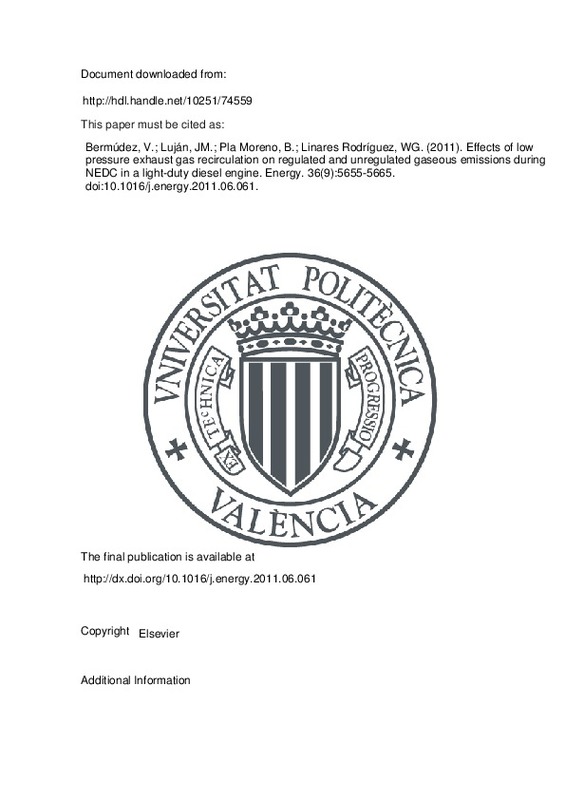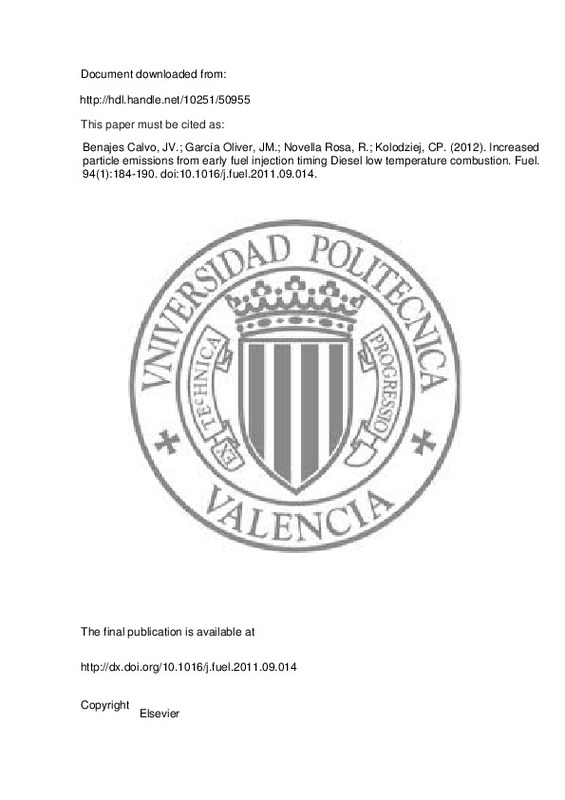Bermúdez, V.; Luján, JM.; Pla Moreno, B.; Linares Rodríguez, WG. (2011). Comparative study of regulated and unregulated gaseous emissions during NEDC in a light-duty diesel engine fuelled with Fischer Tropsch and biodiesel fuels. Biomass and Bioenergy. 35(2):789-798. doi:10.1016/j.biombioe.2010.10.034
Por favor, use este identificador para citar o enlazar este ítem: http://hdl.handle.net/10251/33201
|
Título:
|
Comparative study of regulated and unregulated gaseous emissions during NEDC in a light-duty diesel engine fuelled with Fischer Tropsch and biodiesel fuels
|
|
Autor:
|

 Bermúdez, Vicente
Bermúdez, Vicente

 Luján, José M.
Luján, José M.

 Plá Moreno, Benjamín
Linares Rodríguez, Waldemar Gregorio
Plá Moreno, Benjamín
Linares Rodríguez, Waldemar Gregorio
|
|
Entidad UPV:
|
Universitat Politècnica de València. Departamento de Máquinas y Motores Térmicos - Departament de Màquines i Motors Tèrmics
|
|
Fecha difusión:
|
|
|
Resumen:
|
In this study, regulated and unregulated gaseous emissions and fuel consumption with five different fuels were tested in a 4-cylinder, light-duty diesel EURO IV typically used for the automotive vehicles in Europe. Three ...[+]
In this study, regulated and unregulated gaseous emissions and fuel consumption with five different fuels were tested in a 4-cylinder, light-duty diesel EURO IV typically used for the automotive vehicles in Europe. Three different biodiesel fuels obtained from soybean oil, rapeseed oil and palm oil, a Fischer Tropsch fuel and an ultra low sulphur diesel were studied. The test used was the New European Driving Cycle (NEDC), this allowed tests to be carried out on an engine warmed up beforehand to avoid the effect of cold starts and several tests a day. Regulated emissions of NOX, CO, HC and CO2 were measured for each fuel. Unburned Hydrocarbon Speciation and formaldehyde were also measured in order to determine the maximum incremental reactivity (MIR) of the gaseous emissions. Pollutants were measured without the diesel oxidation catalyst (DOC) to gather data about raw emissions. When biodiesel was used, increases in regulated and unregulated emissions were observed and also significant increases in engine fuel consumption. The use of Fischer Tropsch fuel, however, caused lower regulated and unregulated emissions and fuel consumption than diesel.
[-]
|
|
Palabras clave:
|
Biodiesel
,
Fischer Tropsch
,
Hydrocarbons speciation
,
New European driving cycle
,
Unregulated emissions
,
Automotive vehicle
,
Bio-diesel fuel
,
Cold start
,
Comparative studies
,
Diesel oxidation catalyst
,
Engine fuels
,
Fischer-tropsch fuels
,
Gaseous emissions
,
Light-duty
,
Maximum incremental reactivities
,
New european driving cycles
,
Palm oil
,
Rapeseed oil
,
Regulated emissions
,
Soybean oil
,
Unburned hydrocarbons
,
Diesel engines
,
Hydrocarbons
,
Steel metallurgy
,
Sulfur
,
Synthetic fuels
,
Vegetable oils
,
Alternative fuel
,
Atmospheric pollution
,
Biofuel
,
Carbon dioxide
,
Carbon monoxide
,
Comparative study
,
Diesel engine
,
Formaldehyde
,
Fuel consumption
,
Nitrogen oxides
,
Soybean
,
Speciation (chemistry)
,
Standard (regulation)
,
Traffic emission
,
Vegetable oil
,
Europe
,
Brassica napus
,
Glycine max
|
|
Derechos de uso:
|
Cerrado |
|
Fuente:
|
Biomass and Bioenergy. (issn:
0961-9534
)
|
|
DOI:
|
10.1016/j.biombioe.2010.10.034
|
|
Editorial:
|
Elsevier
|
|
Versión del editor:
|
http://dx.doi.org/10.1016/j.biombioe.2010.10.034
|
|
Agradecimientos:
|
Universidad Politecnica de Valencia (Spain), for granting financial support for the linguistic revision of this paper.
|
|
Tipo:
|
Artículo
|






![[Cerrado]](/themes/UPV/images/candado.png)




